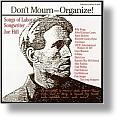On CD
Don't Mourn, Organize!
Smithsonian/Folkways
1990

Track Listing:
- Joe Hill: Billy Bragg
- Joe Hill's Last Will: Utah Phillips
- Joe Hill's Ashes: Mark Levy
- The Preacher and the Slave: n/a
- Joe Hill: Paul Robeson
- Paper Heart: Si Kahn
- Casey Jones (The Union Scab): Pete Seeger
- Mr. Block: Mats Paulson
- Joe Hill Listens to the Praying: Joe Glazer and Lori Elaine Taylor
- The Tramp: Cisco Houston
- Joe Hill: Earl Robinson
- The White Slave: Carlos Cortez
- Narrative: Elizabeth Gurley Flynn
- The Rebel Girl: Hazel Dickens
- There is Power in a Union: Entertainment Workers IU 630 with Utah Phillips
Review: Mythology Trumps History Every Time For The Left
Bill Adams
I have to give this Smithsonian project the highest rating, because it captures one of the enduring myths of the Folk Revival, the Labor Movement, and American leftist politics. And I say all that as a folk music fan, the son of a union member, and a now moderate Democrat who was more radical thirty years ago. Joe Hill was a real person, but good songs, even about real people, do not have to tell the truth to be good songs. The truth seems to be that Mr. Hill probably did shoot down a grocer and his son in a botched robbery, and although he might have been executed partly because of his labor organizing, and his seemingly anarchist politics, that does not mean he was innocent of the crime.
A comprehensive biography, "Joe Hill" by Gibbs M. Smith, is pretty convincing in its thesis that Joe got a fair trial, and a fair appeal, in Utah in 1915. Surprisingly, neither the judge nor the majority of the jurors were even Mormons, whose culture one might think was indeed at variance with Joe's politics. Joe was his own worst witness at the trial, and was pretty much begged to explain how he got a bullet wound at the same moment the grocer died with a discharged weapon in his hands, and why Joe had a handgun and threw it away in that same hour. The book is an eye-opener for those of us who want Joe to be a foul victim of capitalism. That aside, Earl Robinson's song "Joe Hill", adapted from a poem about him, has been a staple of left-leaning songfests for 70 years or so. Paul Robeson's version is on here (one of many he recorded) and to my ears, his was always the best. The disc also gives us Earl Robinson's own rendition. From the '30's to 1989, various aspects of Joe Hill's life, from his songs to his famous last will, to songs about him, and stories about him, are collected here for those who have a soft spot for the labor movement, or the famous song, or the man himself. Not every moment is compelling, but the good stuff on here is really great stuff.
See my long essay on Joe Hill and the question his guilt or innocence: Here.
Notes from the CD
Lori Elaine Taylor
Part of the mission of the Industrial Workers of the World was to organize the unskilled workers whom larger unions considered outside their scope. Many Wobblies migrated seasonally; some stayed in "jungles" near the railways. These workers were sometimes referred to as "tramps," but today we would probably just call them homeless. This struggle has not ended, so the song continues to have relevance to current issues.
Cisco Houston spent a lot of time traveling himeslf, not tramping but singing. When Cisco was twenty-one years old he met twenty-seven year old Woody Guthrie. They sang and travelled together across the country and later joined the Merchant Marines during World War II. Cisco performed on Broadway, television, radio, and in bit-parts in Hollywood Westerns. After he died in 1961, young songwriters included him in the pantheon of the folksong revival heroes. In "Song for Woody" Bob Dylan wrote: "Here's to Cisco,a nd Sonny, and Leadbelly, too," also referring to Sonny Terry and Huddie Ledbetter. Tom Paxton and Peter La Farge each wrote songs specifically about Cisco, just as Alfred Hayes, Woody Guthrie, Phil Ochs, and Si Kahn all wrote about Joe Hill. Cisco Houston had 6 albums of his own on Folkways and appeared on several others.
We welcome any suggestions, contributions, or questions. You send it, we'll consider using it. Help us spread the word. And the music. And thanks for visiting.

